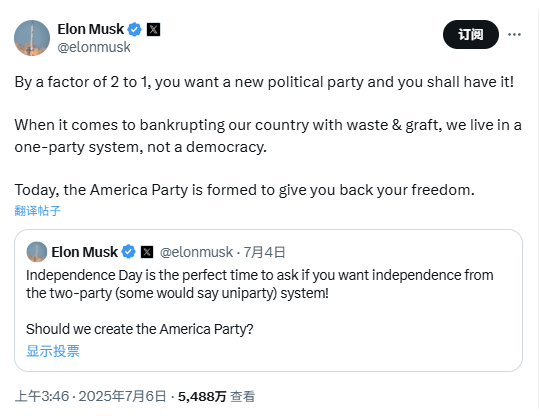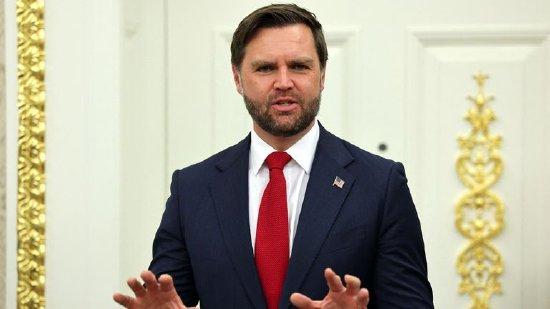According to reports, Tesla CEO Elon Musk has quietly slowed down plans to form a third political party, the "America Party." Insiders reveal that Musk is currently more inclined to focus on the operations of his companies and is cautious about potentially siphoning off Republican votes. At the same time, he is trying to maintain contact with U.S. Vice President J.D. Vance and is considering providing financial support for the 2028 presidential election.
As early as early July 2025, following U.S. President Donald Trump's signing of a controversial "massive tax cut and spending bill," Musk publicly expressed his dissatisfaction. The bill was criticized for increasing the federal deficit by trillions of dollars, and Musk had vehemently opposed it, lobbying Congress to block its passage. After the bill was signed, Musk announced on social media platform X: "Today, the America Party is officially established to restore your freedom." He added, "By a 2-to-1 ratio, you want a new political party, you will get it." This declaration quickly attracted media attention and was seen as a continuation of Musk's break with Trump, who had previously referred to Musk as a "close advisor," but their relationship soured over differences in fiscal policy.

Just over a month later, Musk's attitude changed significantly. Insiders revealed that Musk has informed allies that he wishes to focus his energy on core businesses such as Tesla, SpaceX, and X. These companies are facing multiple challenges: Tesla's stock price is highly volatile, affected by competition in the global electric vehicle market and supply chain issues; SpaceX's Starship project, while progressing well, requires substantial funding to maintain; and the X platform is struggling with content regulation and advertising revenue. Musk may have realized that forming a third political party would not only be time-consuming and labor-intensive but could also divert resources from his business empire. More importantly, he is reluctant to "alienate powerful Republicans," fearing that a new party could siphon off conservative votes, leading to Republican losses in the midterm elections or the 2028 election.
Musk's history of political involvement shows that he often swings between idealism and pragmatism. In 2024, he donated nearly $300 million to support Trump's return to the White House, earning him the media nickname "shadow president." However, as 2025 approached and Trump's policies shifted, Musk's criticism grew, leading to public exchanges between the two. Trump threatened to re-evaluate government contracts with Musk's companies and mocked his "government efficiency department" as a "monster." Now, Musk's retreat is interpreted as a signal to repair relations with the Republican Party.
Insiders reveal that Musk has been seeking to maintain contact with Vance, who is seen as a potential heir to Trump's "MAGA" (Make America Great Again) movement. Vance, a senator from Ohio, is known for his populist stance. He served as Trump's campaign partner in the 2024 election and, after taking office as vice president in 2025, pushed for technology regulatory reforms that align closely with Musk's interests. Notably, after Trump hinted earlier this month that Vance is the most likely candidate to win the next presidential election, Vance responded that he was not focused on the next presidential election.
"My view on the 2028 election politics is—I haven't even focused on the 2026 election, let alone two years from now," he told reporters during a meeting with British Foreign Secretary David Lammy.

Analysts point out that Musk's favorability has significantly declined since his political involvement. According to polls, his overall favorability has dropped to 37%, with only 6% among Republicans. 74% of respondents oppose a third party led by Musk, which may be a reality check prompting him to slow down his plans.
Looking back at history, there are few successful precedents for third parties: Ross Perot's Reform Party (1992) garnered 19% of the vote but failed to sustain itself; Ralph Nader's Green Party (2000) was accused of siphoning votes from the Democratic Party, leading to George W. Bush's election. Musk's "America Party" was initially positioned to "represent the middle 80% of voters," emphasizing fiscal conservatism and social liberalism, but it lacks a concrete platform and grassroots organization. Insiders reveal that Musk's private conversations have mostly remained at the conceptual level, without addressing practical details such as Federal Election Commission registration or state-level certification. These obstacles, combined with high costs (forming a national party requires hundreds of millions of dollars), make the plan difficult to realize.
From a broader perspective, Musk's actions reflect the double-edged sword role of billionaires in politics. On one hand, their wealth and influence can reshape discourse: Musk has dominated public opinion through the X platform and has previously pushed discussions on cryptocurrency and AI regulation. On the other hand, public skepticism about "billionaire politics" is growing. Democrats criticize Musk for "trying to buy elections," while Republicans are concerned about his instability. Shifting support to Vance may be Musk's pragmatic choice: Vance has close ties with Silicon Valley moguls like Peter Thiel, who promotes the integration of technology and government through Palantir. This could bring policy benefits to Musk's companies, such as more lenient autonomous driving regulations or space contracts.
However, this strategy is also fraught with risks. As a "MAGA heir," Vance's populist stance may conflict with Musk's globalist views. Vance has criticized big tech monopolies and supported antitrust actions, which could threaten Tesla's market dominance. Musk's business empire also faces regulatory pressures: the Federal Trade Commission is investigating X's content policies, and the Securities and Exchange Commission is scrutinizing Tesla's autonomous driving claims. If Musk publicly supports Vance, Democrats may seize the opportunity to attack "billionaire control of elections," further eroding his public image.
This article is for informational sharing only and does not constitute investment advice for anyone.
Join our community to discuss this event
Official Telegram community: t.me/aicoincn
Chat room: Wealth Group
免责声明:本文章仅代表作者个人观点,不代表本平台的立场和观点。本文章仅供信息分享,不构成对任何人的任何投资建议。用户与作者之间的任何争议,与本平台无关。如网页中刊载的文章或图片涉及侵权,请提供相关的权利证明和身份证明发送邮件到support@aicoin.com,本平台相关工作人员将会进行核查。




